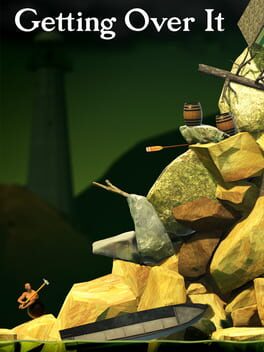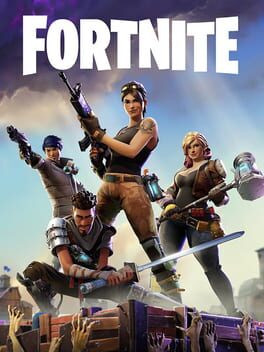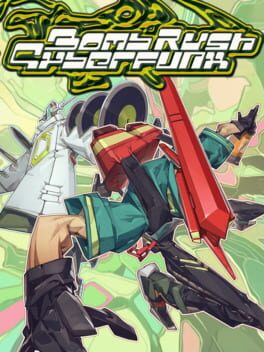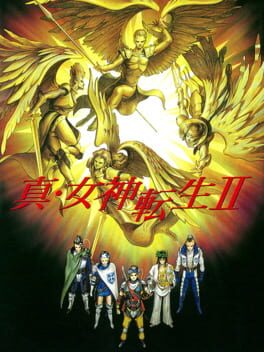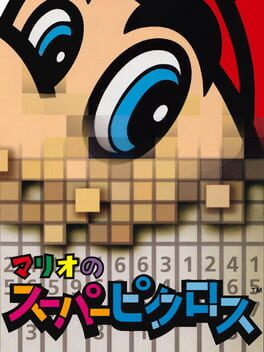Toa
34 reviews liked by Toa
Resident Evil 4
2023
This game's dedication in making every part of its world feel like a real lived place is outstanding, it's something I have always enjoyed about Final Fantasy as a franchise but this one particularly excels at just making you want to have your own adventure at your own pace
I've been fully on board with their vision of making more than a remake of the original story since the beginning but Rebirth truly fully sold me on the idea.
While not flawless by any means, it will be a long time until I encounter another game that feels this ambitious and for lack of a better word, "magical"
I've been fully on board with their vision of making more than a remake of the original story since the beginning but Rebirth truly fully sold me on the idea.
While not flawless by any means, it will be a long time until I encounter another game that feels this ambitious and for lack of a better word, "magical"
“The people who built this world intended it to be better for you, but they failed. It is easier to live in their failure with this by your side.”
[It’s real tell her.]
“This is not a childish fantasy. It can be a real weapon against what’s coming for you now.”
“What’s coming for me?”
“Nothing as long as you have this [Hands her their discarded tape recorder]”
Through the steady decay of a failed revolution, the spread of rot reaches a land birthed by the will of all of it’s people. A Communist Revolution, the last of its kind, was snuffed out by imperialists against the philosophy in Revachol. The war singed the culture of Revachol, scarring them, and leaving people willing to pick up the scraps.
No matter the ideology because of the complexity of the issues surrounding Revachol, every encounter almost meets a selfish action, characters react to the heavy circumstances around them, even the protagonists. The desire and preservation of self is core to the story of the protagonist, found in the remnants of the communist regime, and rooted even within the fascist oppression of Revachol. From the day to day challenge of the world around them to the conflict of war, preservation is gripped until the end. The bizarre protagonist is baffling to Revachol, as he has no sense or remnant of self. Gazing into a mirror is deeply suffocating, treating it as a decision where you can no longer go back. It is the first step to remind him of his origin, his origin it almost strangles him to understand. The protagonist Harry’s self remembrance circulates from the bitter taste of his policing, the absurd persona of his party loving rockstar, or the gentle and sorry reactions to the cruel inevitability of his desire for progress. While DE gives you plenty of facets of a person to role play, I personally tried to rehabilitate Harry, avoiding cruelty and bigotry. The world around him is glint with hope. Like the people of this decomposed city could rise into something meaningful. There is a heavy melancholy in Disco Elysium. There is almost a dreadful acceptance it will steadily derive any say it’s citizens have in it’s government. Even with all of those burdens there is just a deep love for Revachol, a desire to endure, that possessiveness of that city so intense it birthed a war for it’s political freedom, is still there. Through a woman who lost her husband to alcoholism, a dream of playing music made from trees, a girl playing with a stuffed lamb, and a detective who learns to confront his trauma, regardless of the relentless taxing burdens of this world, hope is just as inevitable as the grip of politics.
The irony of the communist state mandated police feels like the best way to play this game. Just like people it’s boundless and absurd. There’s a wonderment to Disco Elysium, while your partner, Kim tends to reign in Harry and be logical, acting far more accepting to preserve at least the safety of citizens in society, Harry can be a far more free spirit. He believes in baffling things, he finds conflict and peace in fanaticism. He has idealized fantasies that he isn’t necessarily supposed to grow out of. He’s can be someone who wants people to be happy even not playing by the books, he wants citizens to prosper. His politics and morals, flexible beliefs, dismissal of the law through it all builds his own Elysium in his mind, while all of it can’t just come true, it brings him comfort. It defines who he is, it defines humans. The self is confusing, fragile, and illogical. Self is built through both beliefs, how they conflict with reality, and how they endure with reality. Harry regains and redefines himself, he learns to embrace himself again, he isn’t someone to idolize, he and all of Revachol is human. He is Revachol itself.
[It’s real tell her.]
“This is not a childish fantasy. It can be a real weapon against what’s coming for you now.”
“What’s coming for me?”
“Nothing as long as you have this [Hands her their discarded tape recorder]”
Through the steady decay of a failed revolution, the spread of rot reaches a land birthed by the will of all of it’s people. A Communist Revolution, the last of its kind, was snuffed out by imperialists against the philosophy in Revachol. The war singed the culture of Revachol, scarring them, and leaving people willing to pick up the scraps.
No matter the ideology because of the complexity of the issues surrounding Revachol, every encounter almost meets a selfish action, characters react to the heavy circumstances around them, even the protagonists. The desire and preservation of self is core to the story of the protagonist, found in the remnants of the communist regime, and rooted even within the fascist oppression of Revachol. From the day to day challenge of the world around them to the conflict of war, preservation is gripped until the end. The bizarre protagonist is baffling to Revachol, as he has no sense or remnant of self. Gazing into a mirror is deeply suffocating, treating it as a decision where you can no longer go back. It is the first step to remind him of his origin, his origin it almost strangles him to understand. The protagonist Harry’s self remembrance circulates from the bitter taste of his policing, the absurd persona of his party loving rockstar, or the gentle and sorry reactions to the cruel inevitability of his desire for progress. While DE gives you plenty of facets of a person to role play, I personally tried to rehabilitate Harry, avoiding cruelty and bigotry. The world around him is glint with hope. Like the people of this decomposed city could rise into something meaningful. There is a heavy melancholy in Disco Elysium. There is almost a dreadful acceptance it will steadily derive any say it’s citizens have in it’s government. Even with all of those burdens there is just a deep love for Revachol, a desire to endure, that possessiveness of that city so intense it birthed a war for it’s political freedom, is still there. Through a woman who lost her husband to alcoholism, a dream of playing music made from trees, a girl playing with a stuffed lamb, and a detective who learns to confront his trauma, regardless of the relentless taxing burdens of this world, hope is just as inevitable as the grip of politics.
The irony of the communist state mandated police feels like the best way to play this game. Just like people it’s boundless and absurd. There’s a wonderment to Disco Elysium, while your partner, Kim tends to reign in Harry and be logical, acting far more accepting to preserve at least the safety of citizens in society, Harry can be a far more free spirit. He believes in baffling things, he finds conflict and peace in fanaticism. He has idealized fantasies that he isn’t necessarily supposed to grow out of. He’s can be someone who wants people to be happy even not playing by the books, he wants citizens to prosper. His politics and morals, flexible beliefs, dismissal of the law through it all builds his own Elysium in his mind, while all of it can’t just come true, it brings him comfort. It defines who he is, it defines humans. The self is confusing, fragile, and illogical. Self is built through both beliefs, how they conflict with reality, and how they endure with reality. Harry regains and redefines himself, he learns to embrace himself again, he isn’t someone to idolize, he and all of Revachol is human. He is Revachol itself.
Fortnite
2017
Sorry Redditors but Fortnite at a time is easily one of the best multiplayer games ever. The skill gap, the building mechanic along with the guns to go along, the metas, the top players, how fun it would be to see your skill increase over time to get better at this game. But i will not lie there are tons of things that killed this game being "Perfect". Zombies in S6, Turbo Build Nerf, Mechs, and fortnite just becoming a big advertisement without its own originality anymore, which is cool in retrospect, we get to see our favorite fictional characters in a shooting/skill based game.But there will NEVER be a game like this EVER again its bound to last and it will stay no matter what, also most peoples complaint about the game is that they cannot build, jesus get good.
Bomb Rush Cyberfunk
2023
One thing I didn't expect from Shin Megami Tensei II was some of the smartest and best executed world-building I have ever seen in a 16-bit game. This game is proof, that, in 1994, Shin Megami Tensei as a series didn't just have "actually decent stories", but SMT2 is easily one of the best games on the SNES when it comes to its scenario and setting.
The scale starts out small, you are in Valhalla, a section of Tokyo Millenium filled with working class people looking to have some time off from their work and some freedom away from the oppressive Center's control, and as you keep playing the game the more the scale of the world opens up to you. With each story-beat, a new area or secret about the world of SMT2 and Tokyo Millenium opens up. You're getting puzzle piece after puzzle piece, and slowly but surely, they all come together in the end to form a cohesive whole. Each section of Tokyo Millenium, like the factory, holy town, valhalla, center, arcadia, the underworld and the abyss have their purpose and place and flesh out the world and story of SMT2. Everything necessary to be able to imagine Tokyo Millenium as a functioning society is there, and its interactions with the underworld and hell create an almost indescribably interesting atmosphere. Fusing sci-fi with the mythological like no other game after or before, the setting of SMT2 is actually one of the most unique and memorable in video game history as a whole, and their seamless and almost logical interation just cements a very immersive atmosphere despite the dated visuals. Each area of Tokyo Millenium can also be seen as presenting arguments or a dilemma for either Chaos or Law on top of that, with the setting not only presenting a great atmosphere and logical world, but is also excellently used to portray the central conflict of the world, which is essential for making your choices in the game feel significant and weighty.
Yes, surprisingly, SMT2 is still the game in the series that explores Chaos and Law the best. Chaos is far from simply about the rule of the strong, and Law is far from simply about brainwashing people. Valhalla is chaos-aligned, it is full of freedom, including discos and casinos, and people having a good time, but there are also Gladiator death matches, horrific slums, high inequality and quickly changing hierarchical conditions. Is the freedom and fun that the people are able to have worth the inequality and horrific conditions? The factory went too far in literally brainwashing the workers in order to work hard, but after turning off the brainwashing, most of the essential workers left the premises and essential farms and factories are left unattended, endangering the population. Maybe some form of order was necessary?
Even Lucifer seems like he genuinely has the interest of the Underworld at heart, the population of the original Tokyo from SMT1 who were too unlucky to get on the Cathedral which eventually became Tokyo Millenium, fored to live under the giant metropolis without sunlight penetrating their country. Lucifer seems like a genuine character in this game - he chose the side of the demons, the mutants, the ugly and downtrodden, and it's understandable why he would, from his perspective, be willing to destroy the faux-utopia of Tokyo Millenium in order to ensure safety and a form of equality for the underworld. All of Lucifer's dialogue portrays him as a reasonable, intelligent being who acts according to his myth without being solely defined by it.
The issues are with the gameplay, getting the teleport spell earlier would do wonders for the game, and having something similar to DQ's escape spell really should have been right there from the start. The battle system is much improved over SMT1, but the balancing is still off, with even YHVH sometimes only doing around 40 damage to each of your characters. The only reason why the two final bosses are even hard at all is that you cannot hit them easily and need to grind for weapons that can be fused into stronger ones which have the required hit rate. The dungeon design, however, is pretty fun and varied, and the layouts present new challenges with each one and generally feel like a big improvement over SMT1. The OST, with the exception of the battle theme, is much weaker compared to SMT1's iconic OST.
Overall SMT2 is bogged down by 90s Atlus rather wonky and amateurish game design, but the game is full of passion, interesting ideas, engaging characters and incredible world-building. Despite being in the same series, SMTII and SMTV are two games that in many ways are the exact opposite of one another.
The scale starts out small, you are in Valhalla, a section of Tokyo Millenium filled with working class people looking to have some time off from their work and some freedom away from the oppressive Center's control, and as you keep playing the game the more the scale of the world opens up to you. With each story-beat, a new area or secret about the world of SMT2 and Tokyo Millenium opens up. You're getting puzzle piece after puzzle piece, and slowly but surely, they all come together in the end to form a cohesive whole. Each section of Tokyo Millenium, like the factory, holy town, valhalla, center, arcadia, the underworld and the abyss have their purpose and place and flesh out the world and story of SMT2. Everything necessary to be able to imagine Tokyo Millenium as a functioning society is there, and its interactions with the underworld and hell create an almost indescribably interesting atmosphere. Fusing sci-fi with the mythological like no other game after or before, the setting of SMT2 is actually one of the most unique and memorable in video game history as a whole, and their seamless and almost logical interation just cements a very immersive atmosphere despite the dated visuals. Each area of Tokyo Millenium can also be seen as presenting arguments or a dilemma for either Chaos or Law on top of that, with the setting not only presenting a great atmosphere and logical world, but is also excellently used to portray the central conflict of the world, which is essential for making your choices in the game feel significant and weighty.
Yes, surprisingly, SMT2 is still the game in the series that explores Chaos and Law the best. Chaos is far from simply about the rule of the strong, and Law is far from simply about brainwashing people. Valhalla is chaos-aligned, it is full of freedom, including discos and casinos, and people having a good time, but there are also Gladiator death matches, horrific slums, high inequality and quickly changing hierarchical conditions. Is the freedom and fun that the people are able to have worth the inequality and horrific conditions? The factory went too far in literally brainwashing the workers in order to work hard, but after turning off the brainwashing, most of the essential workers left the premises and essential farms and factories are left unattended, endangering the population. Maybe some form of order was necessary?
Even Lucifer seems like he genuinely has the interest of the Underworld at heart, the population of the original Tokyo from SMT1 who were too unlucky to get on the Cathedral which eventually became Tokyo Millenium, fored to live under the giant metropolis without sunlight penetrating their country. Lucifer seems like a genuine character in this game - he chose the side of the demons, the mutants, the ugly and downtrodden, and it's understandable why he would, from his perspective, be willing to destroy the faux-utopia of Tokyo Millenium in order to ensure safety and a form of equality for the underworld. All of Lucifer's dialogue portrays him as a reasonable, intelligent being who acts according to his myth without being solely defined by it.
The issues are with the gameplay, getting the teleport spell earlier would do wonders for the game, and having something similar to DQ's escape spell really should have been right there from the start. The battle system is much improved over SMT1, but the balancing is still off, with even YHVH sometimes only doing around 40 damage to each of your characters. The only reason why the two final bosses are even hard at all is that you cannot hit them easily and need to grind for weapons that can be fused into stronger ones which have the required hit rate. The dungeon design, however, is pretty fun and varied, and the layouts present new challenges with each one and generally feel like a big improvement over SMT1. The OST, with the exception of the battle theme, is much weaker compared to SMT1's iconic OST.
Overall SMT2 is bogged down by 90s Atlus rather wonky and amateurish game design, but the game is full of passion, interesting ideas, engaging characters and incredible world-building. Despite being in the same series, SMTII and SMTV are two games that in many ways are the exact opposite of one another.
This game tricked me.
I like Picross, so I thought I'd plow through this on the SNES NSO app. But each time I thought I had finished it, it said "SURPRISE, MORE LEVELS YOU FILTHY PICROSS ADDICT" and I just sighed and accepted my fate.
This game took me 30 hours to complete. That final batch of Wario levels was absurdly difficult, and even after THAT, there are secret surprise levels hidden in a new version of the game's main menu! It's a fine Picross game, but there are plenty of better choices out there.
I like Picross, so I thought I'd plow through this on the SNES NSO app. But each time I thought I had finished it, it said "SURPRISE, MORE LEVELS YOU FILTHY PICROSS ADDICT" and I just sighed and accepted my fate.
This game took me 30 hours to complete. That final batch of Wario levels was absurdly difficult, and even after THAT, there are secret surprise levels hidden in a new version of the game's main menu! It's a fine Picross game, but there are plenty of better choices out there.
Persona 3 Reload
2024
This remake single handedly took a game that I just thought was a very good PS2 RPG and turned it into something really special. I don't think it's my favorite in the Persona series still, but everything this remake adds to the character development, the narrative, the music, and the gameplay makes all the best parts of Persona 3 sing.
I get that it isn't technically definitive. It's missing FeMC and all the content that came with that, and The Answer (Before it gets released as DLC, I hope they overhaul the gameplay!)
But this is basically the "Journey" in it's best form. I'll not going to talk about any real negatives in this review because they are all pointless nitpicks.
Linked episodes? All kino and give the male cast the development they really needed in the original game. Surprisingly well written too.
Tartarus? It's actually fun. I still slightly prefer Persona 5's handcrafted dungeons but P3R does the whole procedural generation thing a lot better, and all the Tartarus blocks look gorgeous.
Even the gardening/cooking/watching TV/walking Koromaru sections give the characters a lot more time together. Fully voiced too.
Theurgies are a great addition to the gameplay. I can see some people finding it to be a bit too easy on normal but harder difficulties do exist. Shift is a great addition to combat too, making normal battles less of a chore, while still retaining the challenge a boss should pose.
As for the voice acting... It's a better dub. The old dub isn't bad but this dub feels better directed, and all the characters have voices that are either incredibly similar to their original one, or fit the same vibe. The only odd one out is Akihiko, but I feel like Alejandro did a fantastic job with his performance and probably has more nuance than Liam's original peformance... though I will say I do feel like 2024 Liam could have pulled it off as well. I blame the lack of variety in his voice on the direction and not Liam himself.
Every menu looks stylish and its fun to browse through, similar to Persona 5. It doesn't look like Persona 5 though... it's just a stylish menu.
I was originally someone who was worried about this remake. The change in the English voice cast, and the idea that a few things might've been axed. But everything in this remake only stands to elevate the game. The expanded ending is really something special too. Everything added to Persona 3 Reload doesn't lose the feel of the original, and only enhances the gameplay and the story's narrative themes. 10/10 experience.
I get that it isn't technically definitive. It's missing FeMC and all the content that came with that, and The Answer (Before it gets released as DLC, I hope they overhaul the gameplay!)
But this is basically the "Journey" in it's best form. I'll not going to talk about any real negatives in this review because they are all pointless nitpicks.
Linked episodes? All kino and give the male cast the development they really needed in the original game. Surprisingly well written too.
Tartarus? It's actually fun. I still slightly prefer Persona 5's handcrafted dungeons but P3R does the whole procedural generation thing a lot better, and all the Tartarus blocks look gorgeous.
Even the gardening/cooking/watching TV/walking Koromaru sections give the characters a lot more time together. Fully voiced too.
Theurgies are a great addition to the gameplay. I can see some people finding it to be a bit too easy on normal but harder difficulties do exist. Shift is a great addition to combat too, making normal battles less of a chore, while still retaining the challenge a boss should pose.
As for the voice acting... It's a better dub. The old dub isn't bad but this dub feels better directed, and all the characters have voices that are either incredibly similar to their original one, or fit the same vibe. The only odd one out is Akihiko, but I feel like Alejandro did a fantastic job with his performance and probably has more nuance than Liam's original peformance... though I will say I do feel like 2024 Liam could have pulled it off as well. I blame the lack of variety in his voice on the direction and not Liam himself.
Every menu looks stylish and its fun to browse through, similar to Persona 5. It doesn't look like Persona 5 though... it's just a stylish menu.
I was originally someone who was worried about this remake. The change in the English voice cast, and the idea that a few things might've been axed. But everything in this remake only stands to elevate the game. The expanded ending is really something special too. Everything added to Persona 3 Reload doesn't lose the feel of the original, and only enhances the gameplay and the story's narrative themes. 10/10 experience.


